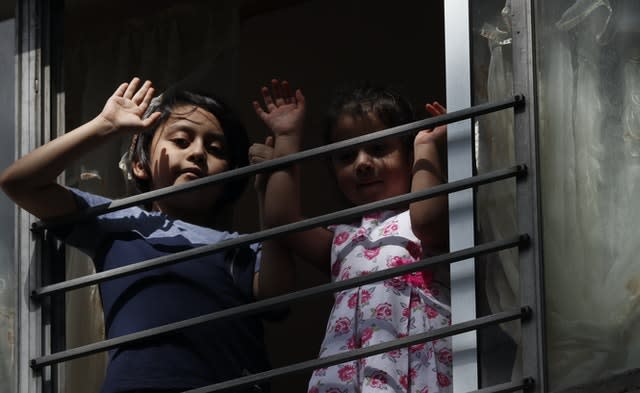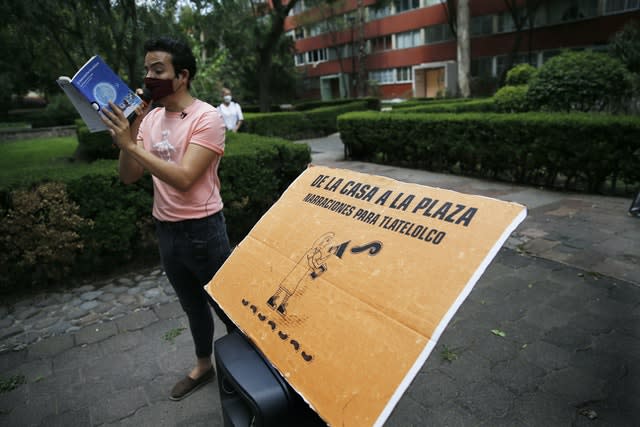Storyteller entertains children in Mexico City apartment complex
A young architect has been entertaining children in an enormous Mexico City apartment complex by broadcasting stories while the youngsters gather at their windows to listen.
Almost every day since the beginning of May, Percibald Garcia has gone out with his “wandering microphone”, setting it up in one of the green spaces that sit between rows of apartment buildings in the Tlatelolco complex.
While most children these days have mobile phones, tablets or computers, Mr Garcia wants them to hear the human voice and the world of shared tales.
The 27-year-old also wants them to realise they can use, even from a distance, the public plazas that have served as the anchor of life in Mexico for centuries.

“We realised that almost nobody was looking after the way that kids were experiencing this lockdown,” Mr Garcia said.
He often precedes a story by playing songs by the celebrated Mexican children’s composer Francisco Gabilondo Soler, who performed as Cri-Cri the cricket.
Sometimes other storytellers perform, as does a puppet group.
And always, children appear at the windows of the multi-storey building to take in the show.
In the end, it is an act of mutual comfort, similar to the Italians who serenaded each other from their balconies early in the pandemic, but also a cry to reclaim shared public spaces and stem the migration to a digital, virtual world.

“In the last three months, everything has gone online – work, contacts, shopping,” said Mr Garcia.
“This is an act of resistance in the face of this ferocious digitalisation we are experiencing.”
Rogelio Morales listened to the stories from the window of his grandmother’s apartment.
Since March, the nine-year-old has spent much of his time playing video games.
“The only thing I go out for is to walk my dog,” he said.
“It’s a little boring. I miss school.”
“It’s nice,” Rogelio said of the storytelling.

“If we have something to do, or if we’re very frustrated, we can relax a little.”
Luna Gonzalez, came with her mother Tatiana Vega to listen to the stories from a safe distance, both wearing face masks.
“I imagine the characters, I imagine what the animals are like,” said Luna, who used the opportunity to go out to dress up in her finest.
“Sometimes we go out, because I get bored at home.”
Mr Garcia calls his project De La Casa A La Plaza (From The House To The Plaza) – a reference to the town squares where historically Mexicans have gathered to socialise and share.
The pandemic hit this aspect of life hard, because people have been encouraged not to go out or gather for fear of contagion.
It is a tradition that has also been altered in the modern neighbourhoods of Mexico’s big cities, where shopping centres have often replaced plazas and parks as gathering spots.

But due to coronavirus, the shopping centres have also been ordered closed in Mexico City.
Mr Garcia’s family has lived in the capital’s Tlatelolco neighbourhood since 1967, just a few years after it opened in 1964.
It originally contained nearly 12,000 apartments and spread over 232 acres (94 hectares).
The government-built complex was erected during a period when architects still felt they had to provide open, communal spaces, something private developers have largely abandoned.
“The public plaza has been extremely important in Mexico since the time of our ancestors,” since the Aztecs, Mr Garcia noted.
“It is where people meet, talk, where the life of a neighbourhood develops.”
“The shopping mall is now the plaza, but it’s private … you have to pay,” he added.
“This kills the public plaza, kills the social structures.”

Some children have even approached Mr Garcia to read their own stories, and other guest storytellers are invited to join.
“This is an invitation to people to continue using the public plaza,” he said.
It is not only children who listen.
Rogelio’s grandmother, Maria Elena Sevilla, also leaned out of her ground-floor window.
“This young man will get a special reward from God, because it is not just children he is entertaining, it is people of my age too,” she said.

 Yahoo News
Yahoo News 
